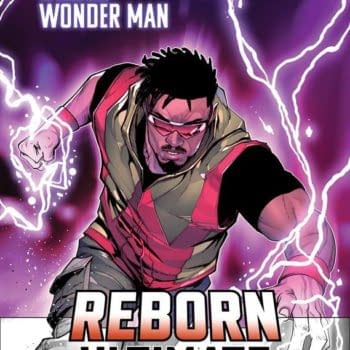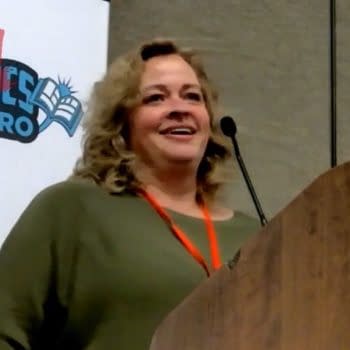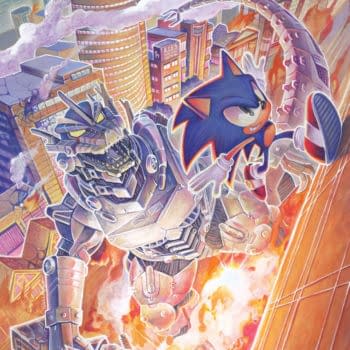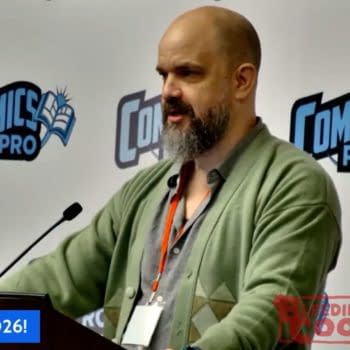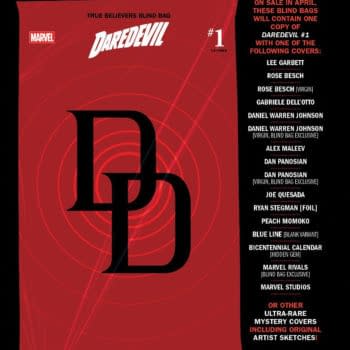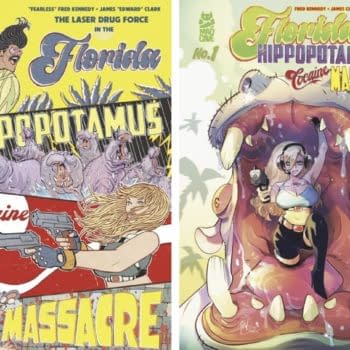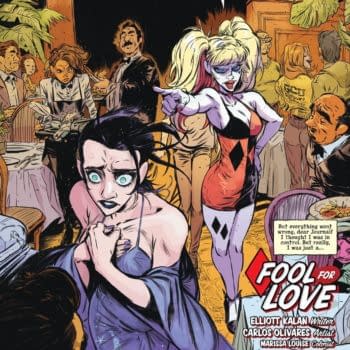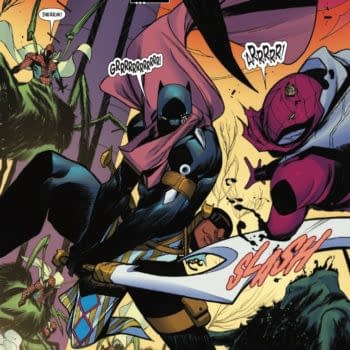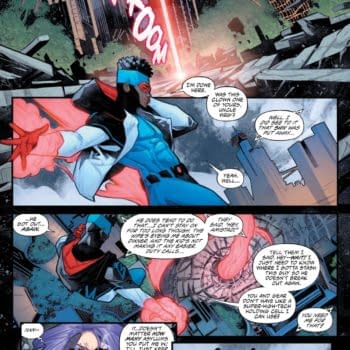Posted in: Comics | Tagged: Comics, HRL
A Chat with Travis McIntire, Publisher of Source Point Press
Ramon Gil writes:
Travis McIntire has been making comics for a long time. He first emerged as a founding member of the Michigan Comics Collective and is now publisher of Source Point Press, which has found an alternative way of bringing their critically acclaimed books to market.
RAMON: Can you tell us how you first got interested in comic books and how and when you decided that you wanted to do it as a career?
TRAVIS: One of my earliest memories with comics was going to a Carl's supermarket when I was a kid. This would have been in the mid- to late-'80s, and my mom would always buy me one comic off their spinner rack. I don't remember what my first comic was, but I had a lot of X-Men and Spider-Man at the time. I very clearly remember when I was around 12 or 13 and Infinity Gauntlet was coming out. That was a big deal for me because I judged which comic I was going to get by how big it was and how many characters were on the cover.
Doing it as a career was something that happened about the time my wife was pregnant with our first child. I had a career already, but with the kid on the way, I felt like I wanted to do something I'd always pondered but never actually put in the work. So… I did. Then one thing led to another. Having our first child really helped streamline my thought process down to what's truly important and to slough off everything that was wasting my time to focus on only high-priority stuff and to try to do the things I really wanted to do.
R: May I ask what that other career is, and has it informed or contributed to your comics work?
T: Sure, I'm a researcher for one of the largest chemical companies in the world. I work specifically in thermal analytics. I think it probably informs my comic work the most in that it is highly disciplined and attention to detail is necessary for success.
R: You were one of the founders of the Michigan Comics Collective. What was it, exactly, and what was your personal motivation in helping create it?
T: The MCC was a loose group of artists and writers in Michigan that sort of came together organically based around Coy's Comics, the LCS in Saginaw, MI. There were several of us hanging around at the time who were interested in or were working on our own self-published books, so we started meeting and planned to do a small book. It grew from there.
After the first book, it turned into a resource for Michigan based creators to get their foot in the door of publishing. Eventually, it ramped down as I didn't have the time to keep it going at the same level, but it still exists as an imprint of Source Point Press, and we still do Michigan-only creators and books.
R: Is there anyone else from the group working regularly in the industry today?
T: Yes — several, actually. Sean Seal just wrapped Norah Vol. 1 as an artist, and Greg Wright has been published all over the place. Stephen Sharar has been doing page work pretty regularly and just wrapped a Marvel gig. One of the people who did some background and fundraising work for us early on is now a Marvel Editor. Dave Andres does a regular webcomic and is still releasing his own indy title, Him! The Lesser Known. A lot of those folks have continued with the industry.
R: A few years ago, I was at Baltimore Comic Con, I think, when I saw your Bayani comic. I'm Filipino, so I was floored to see it. Can you tell me a bit about how that you came up with that and where it stands now?
T: Bayani started with a strange coincidence. I was researching some monsters for a horror thing I wanted to write and fell into this crazy internet rabbit hole reading about Filipino folklore, myths, and monsters. The Filipino monsters were some of the strangest and creepiest I'd ever come across, and I got really into it. Around the same time, I was finishing up a project with an artist named Grant Perkins. Grant happened to show me a three-page short he did in a Filipino motif with the GREAT comic writer Andy Lanning. I loved Grant's work on it, so I re-thought my original horror story into a kid-friendly adventure story and contacted Andy to ask if it was cool if we sort of took the vibe of his three-pager and, boom, there was Bayani. It's three issues in now. The 4-6 scripts are written, and we'll eventually get through it. Right now, it's sort of on hiatus as we've both done other projects, but I really love the story and want to get it all out!
R: I grew up with those myths and they were scary when I was a kid. Never thought of them as children's tales, but you made it work! Have you gotten any feedback from the Filipino community?
T: I have. I have a handful of Filipino friends who I checked with periodically while creating the book, like, "Is it okay that I'm doing this?" and they were always really supportive. I've also gotten a lot of really positive feedback from people who pick it up at conventions. Generally, if someone says, "Hey, that means 'hero'," it's a Filipino person and they often pick it up and give it a read.
R: You are now the head of Source Point Press (SPP). How did that come about, and what would you say makes SPP different from other indie publishers?
T: Source Point came about because of the foresight and hard work of Trico Lutkins and Joshua Werner. I met those two guys because of the Michigan Comics Collective and we started doing some projects together. Eventually, we started having a lot of meetings about different things, and I think we both realized that they needed me and I needed them. I was good at some of the things they weren't and vice versa. Since then, a lot has changed and the company has grown a lot, but it's still essentially based around being friends and wanting the same things out of comics.
I think one of the main ways that we're different is that we are very focused on what we do. We aren't trying to re-invent the wheel and have the next great superhero comic. We have a niche that we feel like we're good at and we put a lot of energy into that. Because of that, we've been able to attract a lot of fans that buy our whole line, as opposed to just following a title or two. We also invest heavily in grassroots talent. People like Greg Wright, Kasey Pierce, Bob Salley, David Hayes, Garrett Gunn, etc. We want to provide these creators the largest platform we can and let them do what they do.
R: I heard on a podcast that you like to use talent that is willing to go out there and sell at comic cons. When I talked to Ben Goldsmith at Wintercon, he said he'd been to over 20 already. Is this true, even for the one-shots, which I've heard you say you guys like to do?
T: Yeah, we look as closely at the creator as we do the art and writing of the book. It's an extremely competitive business, and you need to be willing to go out and find your fans. Creators that do that tend to be more successful with us. We try our hardest to make it easy, though. We have space at over 50 events annually, including many of the world's largest and we usually (but not always) cover hotel expenses, space, badges, etc.
R: What have been your biggest obstacles in your career and in building SPP?
T: Money and time. Building and maintaining the publisher takes money and time. Lots of both. I've personally done 78 conventions in the last two years. The company has done over 100. That's a lot of time away and a lot of up-front investment.
R: How did your personal relationships with other creators help shape your career path and the forming of SPP?
T: I think when you're an unknown publisher, it's just like being an unknown creator. Nobody wants to just entrust you with their work. If it wasn't because we already had such good personal relationships with so many creators in our region, I don't think we would have been able to attract the talent that we did so quickly.
R: Does SPP only do creator-owned, or do you guy have properties of your own?
T: We have both. And we have several that are a bit of a mixture, where we are paying production, but the creators are still maintaining ownership of the IP, but we make our investment back upfront. We try very hard to keep creators invested in their own creations and as interested as possible into putting them into the world across a variety of media.
R: How many people are involved with SPP? Are they full-time?
T: There's quite a few involved. Only two full-time guys, though: me and Josh. Everyone else is part-time or contract. I have to shout out Gary and Josh Sobek, Devin Foether, Stephen Sharar and Andy Reis here. Without those guys doing so much stuff, from convention grunt work, to helping in the warehouse, to driving… we would have never got off the ground.
R: What's your long-term vision for SPP?
T: I suppose ultimately I'd like to be able to take an IP from its beginning as a comic all the way through other media platforms, like film, toys, games, etc. Similar to what we did with Rottentail. I want to be able to do it all in-house and be our own production company. I don't want to go looking for investment, or ask permission, or get pitches approved. I just want to say, "Yep, we like this and we think it'll work," and go do it.
R: I hear ya! I've come to the conclusion that with today's technology, there's really no barrier to making our own films just as we can self-publish our own books nowadays. Can you expand a little on Rottentail? How did the property came to you, and what went into deciding to make a movie out of it?
T: Rottentail was actually optioned, which means for a small fee a studio takes over the rights with the intent to make a film out of it. It sat around and gathered dust. Meanwhile, we'd built this awesome pitch deck for it and had a script that got really great coverage, and we'd started talking to Brian Skiba about directing it. Ultimately, the option ran out, and I just decided to make the movie on our own. I might still come to regret it, because it isn't a trivial cost… but so far so good.
R: Do you personally have any of your own projects in the works?
T: I am fairly firm in my belief that if you're going to be a creator, be a creator, and if you're going to be a publisher and editor, be a publisher and editor. I spend a lot of my energy on being the best publisher and editor that I can be. Honestly, I feel like I'm better at shepherding other people's stuff through the process than I ever was at creating my own, ha!
R: Hmm. I'm a little torn by that. Aside from writing and self-publishing, I enjoy organizing events for other creators. Building communities has always been a theme with me.
T: That being said, I do still putter around in my spare time! Up the River #2 will be out pretty soon actually. And Bayani will be making a comeback in 2018, and another one-shot I did with Grant will finally see the light of day soon. I've also been working on a side project with Corinne Roberts that has been really fun, and we may publish a miniseries at some point in the future.
R: So aside from these books, is publishing comics your ultimate career goal?
T: I think that at this point, being a publisher and producer has become my main goal. I really like collaboration, and I really like bringing a project to life by bringing together all the different elements, from the creators to the designers to the printers to the distributors.
R: Do you see anything particularly wrong with the comic book industry today and if so, do you have any solutions to suggest?
T: I think the indie scene is as strong as it's been since the mid-'90s. Hopefully, we're smarter than we were then and we don't all go bankrupt and disappear soon, but I think the independents are here to stay this time. Things like Kickstarter, Comixology, better publishing tools at lower prices are making it easier than ever to make great products and get them out there. It's a real paradigm shift.
If there's anything "wrong" with comics, it's the super hardcore fans of the big two, referring specifically to those who feel like they "own" these characters. You don't. You don't actually have a say in what the companies do with their characters. If you think that comics having an opinion and making social commentary is new, you aren't as big a fan as you think you are, you're just a fanboy who's into superheroes and maybe you should grow up. Comics have ALWAYS been doing this. Personally I think companies like Marvel are being MORE true to their characters when they are changing them up, doing different things and taking a stance on social issues. If the things the characters are doing is making you uncomfortable, good. If it's making you reexamine the things you thought you believed, good.
R: That's great! I love change! Especially when it forces you to see things in a different light. But I know a lot of comic book readers want their comics exactly the way it was when they were 10 or 11. The problem with that is that they're adults now and will never be able to enjoy a comic as a child, despite a publisher's efforts to make the stories more "mature." Do you have a philosophy as to what kind of stories you want SPP to put out?
T: I don't have an overarching philosophy so much as that they should be good stories, honestly told. I don't want to pander to a market (even though we're a horror and sci-fi publisher), but we do spend a lot of effort looking for books that fit our vibe. Which is, I suppose, a bit like porn. I can't define it, but I know it when I see it.
R: Knowing how hard this business is, what is it you love about it that keeps you going?
T: The feeling you get when you open the new shipments of books that you helped bring into the world and now they're a physical thing that you're holding in your hand. Always a really cool feeling. It's not quite like anything else.
R: What advice would you give to aspiring creators who may want to be picked up by SPP?
T: Pitch us stuff that fits us. We publish horror and sci-fi. Get to know us and show me how you fit our brand. Understand that good stories and art aren't that difficult to find. They're at every comic show every weekend of the year. But good stories with great art AND a creator with the drive to get their work out there and market and push and succeed, is much more rare and much more attractive.
R: I'm actually putting together an anthology now with other people's work and not just my own. The idea is to be a publisher of story-driven books that highlight diversity. Any advice for an aspiring publisher?
T: Learn the nuts and bolts of how to set up files for print and for the bigger digital platforms. I'm far from an expert, but I know my way around Photoshop, Illustrator, etc., and I think it's key to learn what things should look like that leads to a good-looking, professional final product.
R: So I got Ben Goldsmith on a panel at Winter Con this past weekend. Do you have any comment to allegations that beards are mandatory at SPP?
T: Total fabrication. Josh is a fresh-faced young lad with nary a whisker. So, certainly not a requirement. However, people do look BETTER with beards…
R: Ha! I shaved my beard when I switched from running a marketing company to making comics. Maybe I should grow it back!
T: Without question.
Ramon Gil is the writer/creator of Men from DARPA, The Hard Code, Senturies and the Scifies Anthologies.







